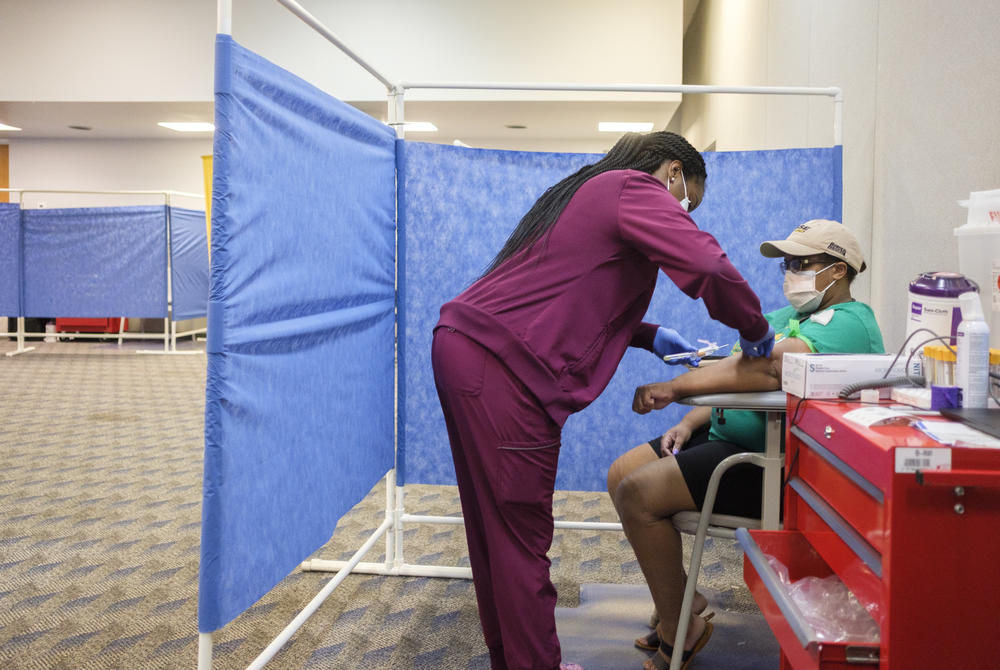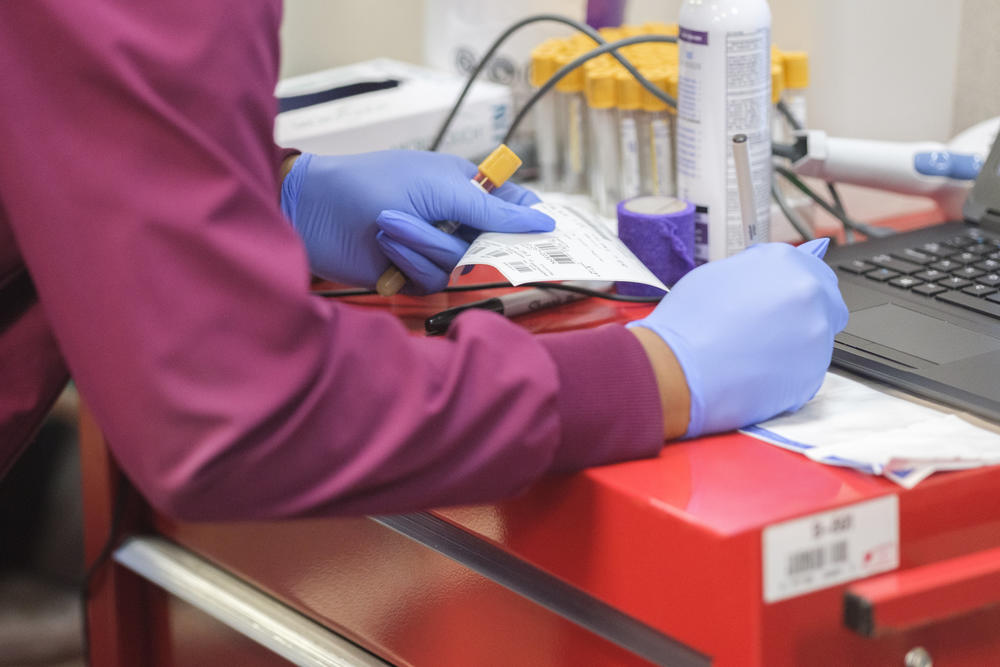
Caption
Nikeira Hall gives a blood sample as a part of the Augusta University coronavirus antibody study in Dougherty County at the Albany Civic Center recently.
Credit: Grant Blankenship/GPB
|Updated: October 2, 2020 3:43 PM
A one-time global COVID-19 hotspot, Albany, Georgia, is now the site of a coronavirus antibody study aimed at understanding viral spread and immunity.

Nikeira Hall gives a blood sample as a part of the Augusta University coronavirus antibody study in Dougherty County at the Albany Civic Center recently.
Nikiera Hall came to the Albany Civic Center on a recent Wednesday morning, ready to give blood.
Not a lot of blood; just a little vial, like you do when you get a physical. Along with the blood, Hall gave the research team from Augusta University a little information about who she is and where she lives.
“Oh, it's totally anonymous,” clinical informaticist Patricia Meadows assured Hall. “Basically, it's going to look at some prior COVID-19 testing questions and then some risk factor questions and then some demographic questions.”
Maybe the most important question: Whether or not Hall knows she ever had COVID-19?
The researchers are asking two questions of 3,200 people in Albany and Dougherty County. One: How many infections went undetected here and what does that mean for the spread of the virus in general? And two: How many people who tested positive for the coronavirus still may have some immunity to it in this community that, for a short time in the spring, suffered as much as anywhere in the world with COVID-19?
If you didn’t know what antibodies were before the COVID-19 pandemic, you probably do now.
Antibodies are signaling devices our bodies’ immune systems create when a virus or bacteria makes us sick. In the case of the novel coronavirus SARS-CoV-2, antibodies are the things that tell the immune system of someone who has had the coronavirus once to fight it, again, in the case of a second round of the virus.
What is still unknown is how long these antibodies last. And, because there are people who had the coronavirus but never knew it, it's also not known how widespread even partial immunity to the virus might be.
“I haven't been around nobody who have had it,” Hall said. “But I do know people that have come in contact with it.”
Even so, given how intense the COVID-19 outbreak was in Albany near the start of the pandemic (the city was once in the top three globally for per capita infections), and given that Hall is only in her 30s, she might have once carried the coronavirus and never known it.
If the researchers find the antibody they are looking for in Hall’s blood, and in the blood of other participants who never tested positive for the virus, then health officials will have a far better picture of asymptomatic spread of the virus.
How widespread unrecorded, asymptomatic coronavirus infections are is an open question that other studies like this, called seroprevalence studies, have attempted to answer.
A study just published in the British medical journal The Lancet looked at a sampling of dialysis patients from across the United States. There, only 10% of study participants showed signs of coronavirus antibodies, suggesting immunity through asymptomatic spread may not be common at all.
On the other hand, in Iceland, 44% of people participating in a study, who tested positive for antibodies, had never tested positive for a viral test. That suggests a high level of asymptomatic spread.
An antibody study in New York state suggested that the number of people infected with the coronavirus there could have been ten times higher than the tally calculated by looking at positive viral tests, aka cases of COVID-19, alone.
Dr. Philip Coule, chief medical officer at Augusta University, said he expects the data from Albany to look a lot like the data from New York and Iceland.
“I think there is a high probability that we have people that were exposed at a low level, have minimal symptoms, never got [a] test, but could be antibody positive,” Coule said.

A medical technician records details about Nikeira Hall's blood sample, given as a part of the Augusta University antibody study in Dougherty County.
There is a second question. Do people who had cases of COVID-19 documented by positive viral tests very early in the pandemic, people like Lew Culpepper, still have coronavirus antibodies?
“Well, we took a test back in April, and I tested positive,” Culpepper said. The test was partly out of curiosity, partly so he and his wife, Maelu, could see their grandchildren.
“I've had no symptoms, no fever, no cough,” Culpepper said after completing the antibody study. “And I've tested four times since for various reasons and been negative every time since.”
Dr. Coule said people such as Culpepper who know when they were carrying the virus are central to what he’s trying to find out.
“So, as you know, there've been studies that suggest that the immunity falls off really quickly. But there are also studies that contradict that,” Coule said.
If six months after his infection Culpepper still has antibodies, and if there are more people in town like him, that would be more data for the “antibodies stick around” camp. It would extend the time we think COVID patients keep immunity post-infection.
On the other hand, if enough people who know they had COVID-19 turn out not to test positive for antibodies, Dr. Coule said maybe it means we should take a second look at the antibody test itself and at what a “positive” result even means.
Coule said antibody tests aren’t an-either-you-have-it-or-you don’t kind of thing. Your blood is a liquid into which antibodies and other cells and substances are dissolved. Current antibody tests could be set up to look for too strong a concentration of antibodies.
“When they develop a test, they've got to figure out where the cutoff is,” Coule said. In the case of this test, the cutoff was set by looking at antibody levels of people sick enough to be hospitalized with COVID-19 — people who presumably carry lots of antibodies.
It might be that the threshold for a positive antibody test should move to better reflect the relatively lower level of antibodies people might carry six months after having COVID-19.
“It's like at what point, at what time, are you going to say that this is a positive?” Coule said.
For the most thorough picture of virus spread, Coule said the study is looking for people from ZIP codes across Dougherty County, where Chris Cohilas chairs the county commission.
Cohilas said for him the study is another way his community is still working to flatten the curve of the coronavirus.
“Does it allow us to access certain medical doctors and researchers that can say, ‘You know, these are different policies perhaps that are more finely tuned for your community?’” Cohilas said.
Some of those policies could address comorbidities like diabetes and hypertension that contributed to the high COVID-19 death rate in Albany. What those policies might be, Cohilas can’t yet say, though he points to a county partnership with an organic farming nonprofit, meant to expand access to fresh food in Dougherty County, as an example.
Meanwhile, the data collection period for the Augusta University antibody study in Dougherty County is almost over. Results are expected by the end of the year.